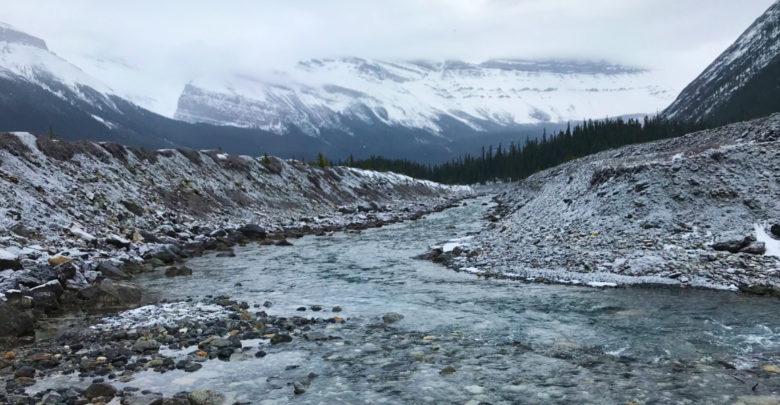 Supplied by Jessica Serbu
Supplied by Jessica SerbuThe quality of drinking water and the influence of melting glaciers in western Canada is being explored in a new research project.
Called “From the Mountains to Our Tables: Freshwater Security in Three Canadian Eastern Rocky Mountain Watersheds,” the project is being conducted by a group of University of Alberta scientists in an interdisciplinary approach. The team has set up 14 sampling stations from the Columbia ice fields in the Canadian Rocky Mountains into three of the province’s main watersheds: the Bow River, Athabasca River, and North Saskatchewan River.
For researcher Suzanne Tank, professor in the department of biological sciences, the project fills an important knowledge gap about the origin of water from our glacier system.
“The headwaters in these proglacial systems are not well understood,” Tank said. “We are curious to understand how the amount of water will change, as well as the chemistry of water and the subsequent effects on the food web and water quality into the future.”
The team is sampling water quality, contaminants, productivity, and food webs from microorganisms to fish, in order to understand the water quality and its changes over time.
Each of the sampling stations were assembled in this past summer and continue to be monitored by PhD students studying under the supervision of professors involved in the project.
Vincent St. Louis, professor in the department of biological sciences, described how glacial melt effects influence water chemistry now and down the line.
“[The pesticide] DDT that was used back in the 1950s has been deposited in these glaciers and locked in the ice,” St. Louis said. “Now that they’re melting, there is the potential that DDT will be released into the drinking water.”
The group of scientists from both the faculty of science and faculty of agricultural life and environmental sciences hope to better inform public policy surrounding watershed protection and water usage moving forward, especially as the planet responds to climate change. Additionally, the group will work with local Indigenous communities, such as the Stony Nation and others, adjacent to glaciers and downstream.
This research project is part of the U of A’s Canadian Mountain Network centre of excellence, which was established in 2019 to support research partnerships exploring and supporting both the resilience and health of Canada’s mountain peoples based on Indigenous and western ways of knowing.
The researchers hope the results of the project will have many wide-reaching implications not just for drinking water treatment, but also for ecosystem management and global climate change models.




